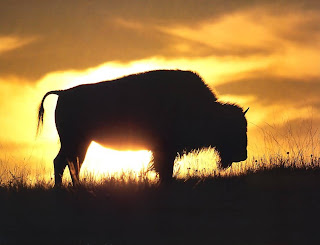It’s my last post in June and the end of my buffalo series.

About five years ago I had one of the HUGEST aha moments of my life. I’m talking light bulb, epiphany, angel’s singing, paradigm shift, vision opened – you name the metaphor, I experienced it.
I wish I could re-create the experience for you instantaneously here on this post. Such experiences loose some of their Sha-Zam in the retelling.
In that moment, I discovered that my brain was lying to me. How rude! I assumed (took for granted, really), that my brain would always tell me the truth.
Not so.
It turns out that the human brain is a massive recording device that captures every message the five senses receive and deliver even from the time we are embryos growing in utero. Imagine. Every conversation, sound, and TV commercial we’ve ever been exposed to is swirling around in our brain’s data base. When we are not consciously in control of our thoughts, the brain flips through its myriad files and chooses its own “scripts” or programs to run. This is the brain on autopilot, and its a dangerous thing because those automatic programs are not always accurate. And they run amuck like stampeding buffalo.
First. Pay attention. Identify your ANTs.
Big concept here. What are the ANTs (the Automatic Negative Thoughts) your brain defaults to when you are not consciously running your brain?
Second. Write Down your ANTs.
Write down your ANTs. Get a notebook and draw a line down the middle of the page. On the left, write down your ANTs. What does your brain tell you over and over, like a broken record? For years, one of my ANTs was that because I was a full-time mother without a salary check with my name in print on the payee line, I was a sub-par version of a successful person. My brain would tell me this concept over and over with different wording or presentation, but the message was always the same. This really made my life miserable, because I was a full-time mom spending every waking hour (and lots of midnight hours) doing “mom work” for no pay. And I wasn’t even aware that my own brain was making me miserable.
Third. Write Down the TRUTH.
On the right side of your paper, next to your ANT, write down the truth. This is how you train your wild buffalo. For example, on my paper I wrote:
ANT: By choosing to be a mother without a paying career, I am not as important, successful, or valid as a person with a paying job.
TRUTH: Being a Mother is the most important, critical, valuable job in the world. Even if I earned a paycheck, my work at a “job” would not be more important than my work as a mother.
Fourth. Replace your ANTs with Truth.
Be conscious of when your brain hits the “continual repeat” button and plays your ANTs like a broken record. When you catch your brain “playing” an ANT script, consciously replace that ANT with your truth.
Fifth. Feel the Power.
There is power in writing down the fallicies that your brain automatically tells you. Putting those falsehoods into words drains them of their power. Writing them on paper makes you realize how absurd they can be and diminishes the hold they have on you.
Writing down your truth is powerful. Verbalizing how you really think and feel (or want to think and feel) gives you power over your brain’s auto-programming. It’s amazing how much power we give away. We let the messages that have come into our brain for years dictate how we feel about our lives. No one can drive your life wagon better than you can. No one can decide better than you can where you want to go.
Once you start to become aware of the wild buffalo (those untamed ANTs) that steer your wagon off course, it’s amazing how you can whip them into shape and start driving off into the sunset. If that’s where you want to go.
mw






